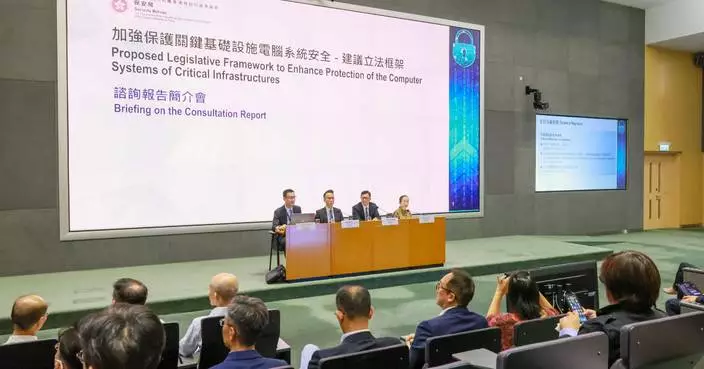Provisional statistics of retail sales for September 2024
The Census and Statistics Department (C&SD) released the latest figures on retail sales today (November 1).
The value of total retail sales in September 2024, provisionally estimated at $29.6 billion, decreased by 6.9% compared with the same month in 2023. The revised estimate of the value of total retail sales in August 2024 decreased by 10.0% compared with a year earlier. For the first 9 months of 2024 taken together, it was provisionally estimated that the value of total retail sales decreased by 7.6% compared with the same period in 2023.
Of the total retail sales value in September 2024, online sales accounted for 10.4%. The value of online retail sales in that month, provisionally estimated at $3.1 billion, decreased by 11.8% compared with the same month in 2023. The revised estimate of online retail sales in August 2024 decreased by 0.7% compared with a year earlier. For the first 9 months of 2024 taken together, it was provisionally estimated that the value of online retail sales decreased by 2.0% compared with the same period in 2023.
After netting out the effect of price changes over the same period, the provisional estimate of the volume of total retail sales in September 2024 decreased by 8.7% compared with a year earlier. The revised estimate of the volume of total retail sales in August 2024 decreased by 11.7% compared with a year earlier. For the first 9 months of 2024 taken together, the provisional estimate of the total retail sales decreased by 9.2% in volume compared with the same period in 2023.
Analysed by broad type of retail outlet in descending order of the provisional estimate of the value of sales and comparing September 2024 with September 2023, the value of sales of commodities in supermarkets decreased by 1.1%. This was followed by sales of electrical goods and other consumer durable goods not elsewhere classified (-7.6% in value); jewellery, watches and clocks, and valuable gifts (-17.9%); food, alcoholic drinks and tobacco (-3.2%); wearing apparel (-8.7%); medicines and cosmetics (-2.5%); commodities in department stores (-11.4%); motor vehicles and parts (-26.7%); fuels (-8.6%); furniture and fixtures (-14.4%); footwear, allied products and other clothing accessories (-3.8%); Chinese drugs and herbs (-17.7%); and optical shops (-10.6%).
On the other hand, the value of sales of other consumer goods not elsewhere classified increased by 2.9% in September 2024 over a year earlier. This was followed by sales of books, newspapers, stationery and gifts (+20.3% in value).
Based on the seasonally adjusted series, the provisional estimate of the value of total retail sales decreased by 1.0% in the third quarter of 2024 compared with the preceding quarter, while the provisional estimate of the volume of total retail sales decreased by 2.0%.
Commentary
A government spokesman said that the value of total retail sales continued to decline in September from a year earlier, but the rate of decline narrowed. On a seasonally adjusted month-to-month comparison, the value of total retail sales recorded an increase.
Looking ahead, the spokesman said that the near-term performance of the retail sector would continue to be affected by the change in consumption patterns of residents and visitors. Nevertheless, an improved outlook for the Mainland economy following the recent introduction of a wide range of stimulus measures, and a possible easing of the Hong Kong dollar alongside the US dollar with the commencement of the US interest rate cut, would be conducive to boosting sentiment and supporting spending. In addition, the Central Government's various measures benefitting Hong Kong, the SAR Government's various initiatives to boost market sentiment and increasing employment earnings would also benefit the retail sector.
The spokesman added that the Policy Address this year includes various measures that would benefit the retail sector, such as developing new tourist hotspots, relaxing visa application criteria for some ASEAN countries, and boosting "silver consumption". The Policy Address has also launched a series of measures to assist small and medium enterprises (SMEs), including those in the retail sector, in addressing the challenges encountered in the process of economic restructuring. These include relaunching the principal moratorium under the SME Financing Guarantee Scheme to ease the repayment pressure of enterprises, expanding the geographical coverage of E-commerce Easy to the 10 ASEAN countries, and relaunching the Hong Kong Shopping Festival in the next two years to help SMEs develop e-commerce business to expand their markets. These measures would help the retail sector in transitioning through the economic restructuring period and improve its prospects.
Further information
Table 1 presents the revised figures on value index and value of retail sales for all retail outlets and by broad type of retail outlet for August 2024 as well as the provisional figures for September 2024. The provisional figures on the value of retail sales for all retail outlets and by broad type of retail outlet as well as the corresponding year-on-year changes for the first 9 months of 2024 taken together are also shown.
Table 2 presents the revised figures on value of online retail sales for August 2024 as well as the provisional figures for September 2024. The provisional figures on year-on-year changes for the first 9 months of 2024 taken together are also shown.
Table 3 presents the revised figures on volume index of retail sales for all retail outlets and by broad type of retail outlet for August 2024 as well as the provisional figures for September 2024. The provisional figures on year-on-year changes for the first 9 months of 2024 taken together are also shown.
Table 4 shows the movements of the value and volume of total retail sales in terms of the year-on-year rate of change for a month compared with the same month in the preceding year based on the original series, and in terms of the rate of change for a three-month period compared with the preceding three-month period based on the seasonally adjusted series.
The classification of retail establishments follows the Hong Kong Standard Industrial Classification (HSIC) Version 2.0, which is used in various economic surveys for classifying economic units into different industry classes.
These retail sales statistics measure the sales receipts in respect of goods sold by local retail establishments and are primarily intended for gauging the short-term business performance of the local retail sector. Data on retail sales are collected from local retail establishments through the Monthly Survey of Retail Sales (MRS). Local retail establishments with and without physical shops are covered in MRS and their sales, both through conventional shops and online channels, are included in the retail sales statistics.
The retail sales statistics cover consumer spending on goods but not on services (such as those on housing, catering, medical care and health services, transport and communication, financial services, education and entertainment) which account for over 50% of the overall consumer spending. Moreover, they include spending on goods in Hong Kong by visitors but exclude spending outside Hong Kong by Hong Kong residents. Hence they should not be regarded as indicators for measuring overall consumer spending.
Users interested in the trend of overall consumer spending should refer to the data series of private consumption expenditure (PCE), which is a major component of the Gross Domestic Product published at quarterly intervals. Compiled from a wide range of data sources, PCE covers consumer spending on both goods (including goods purchased from all channels) and services by Hong Kong residents whether locally or abroad. Please refer to the C&SD publication "Gross Domestic Product by Expenditure Component" for more details.
More detailed statistics are given in the "Report on Monthly Survey of Retail Sales". Users can browse and download this publication at the website of the C&SD (www.censtatd.gov.hk/en/EIndexbySubject.html?pcode=B1080003&scode=530).
Users who have enquiries about the survey results may contact the Distribution Services Statistics Section of C&SD (Tel. : 3903 7400; E-mail : mrs@censtatd.gov.hk).











